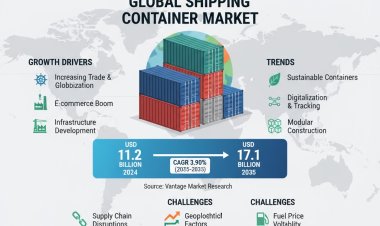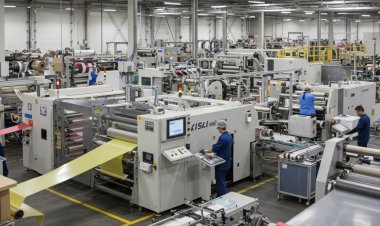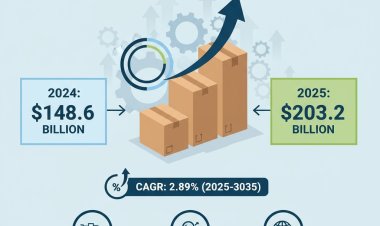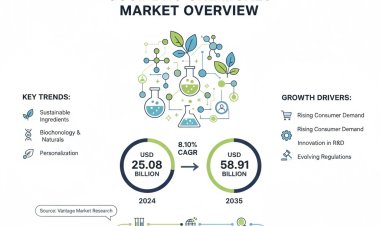Artificial Intelligence in Genomics Market Size, Growth, Technologies, and Future Trends
Explore how artificial intelligence is revolutionizing genomics, driving market growth, enabling precision medicine, and shaping the future of healthcare. In-depth analysis of technologies, applications, regional dynamics, and competitive landscape.

Artificial Intelligence in Genomics: Transforming Healthcare and Unlocking the Future of Precision Medicine
Key Takeaways
- The global AI in genomics market is projected to grow from USD 785.12 million in 2024 to USD 28,999 million by 2035, at a CAGR of 43.2%.
- AI is revolutionizing genomics by enabling rapid analysis of massive datasets, accelerating drug discovery, and advancing personalized medicine.
- Key market drivers include the explosion of genomic data, demand for precision medicine, and technological advancements in AI.
- Major challenges include data privacy concerns, high implementation costs, and regulatory hurdles.
- North America leads the market, while Asia Pacific is emerging as a high-growth region.
- Leading companies are focusing on partnerships, acquisitions, and innovation to maintain competitiveness.
- Future trends point to deeper AI integration, government support, and new applications in clinical genomics.
Overview of the AI in Genomics Market
The intersection of artificial intelligence (AI) and genomics is one of the most exciting frontiers in healthcare today. As sequencing technologies have become faster and more affordable, the volume of genomic data has exploded, creating both opportunities and challenges. AI, with its ability to process and interpret vast datasets, is now at the heart of this transformation. According to Vantage Market Research, the global AI in genomics market is valued at USD 785.12 million in 2024 and is expected to skyrocket to USD 28,999 million by 2035, reflecting a staggering CAGR of 43.2% between 2025 and 2035. This exponential growth is driven by several key factors.
First, the sheer scale of genomic data being generated is unprecedented. Modern sequencing platforms can decode entire human genomes in hours, producing terabytes of data per experiment. Traditional bioinformatics tools struggle to keep pace, but AI algorithms—especially those based on machine learning and deep learning—can rapidly identify patterns, mutations, and correlations that would be impossible for humans to detect unaided. This capability is accelerating research, improving diagnostics, and enabling the development of targeted therapies.
Second, the demand for precision medicine is surging. Patients and clinicians alike are seeking treatments tailored to individual genetic profiles, and AI is making this vision a reality. By integrating genomic, clinical, and lifestyle data, AI systems can predict disease risk, optimize drug selection, and even forecast treatment outcomes. This not only improves patient care but also reduces healthcare costs by minimizing trial-and-error prescribing.
Get a Sample Copy:- https://www.vantagemarketresearch.com/artificial-intelligence-in-genomics-market-2252/request-sample
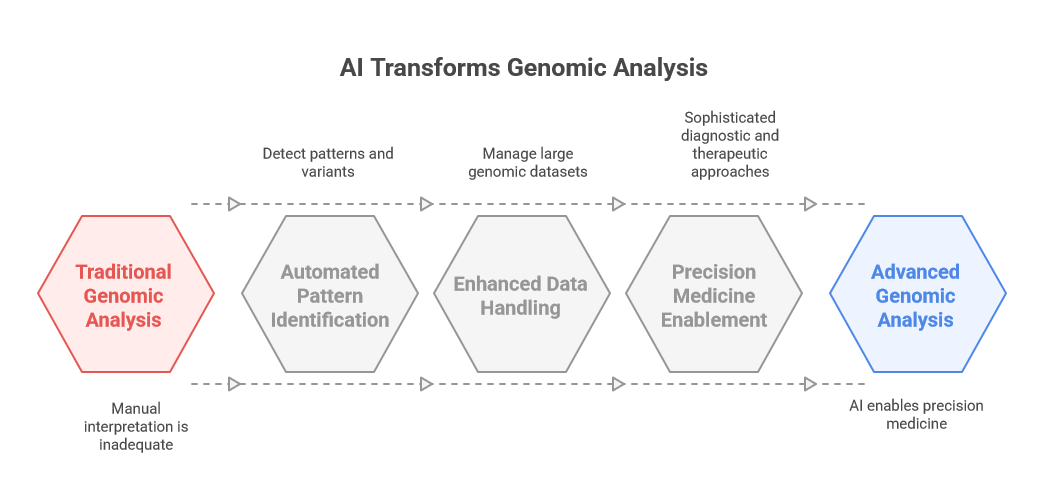
However, the market faces significant challenges. Data privacy and security are paramount concerns, as genomic information is highly sensitive. Ensuring compliance with regulations such as GDPR and HIPAA adds complexity and cost. Additionally, the high upfront investment required for AI infrastructure and the shortage of skilled professionals in both genomics and data science can slow adoption. Despite these hurdles, the momentum behind AI in genomics is undeniable, with stakeholders across academia, industry, and government investing heavily in this transformative field.
Technology and Applications
The technological landscape of AI in genomics is both diverse and rapidly evolving. At its core, the field relies on advanced machine learning algorithms, including deep neural networks, natural language processing (NLP), and reinforcement learning. These technologies are deployed across a range of platforms, from high-performance computing clusters to cloud-based solutions, enabling scalable and flexible analysis of genomic data.
One of the most dominant technologies is deep learning, which excels at recognizing complex patterns in large datasets. In genomics, deep learning models are used to predict the functional impact of genetic variants, identify disease-associated mutations, and even reconstruct evolutionary histories. Natural language processing is also gaining traction, particularly in mining scientific literature and electronic health records for relevant genomic insights.
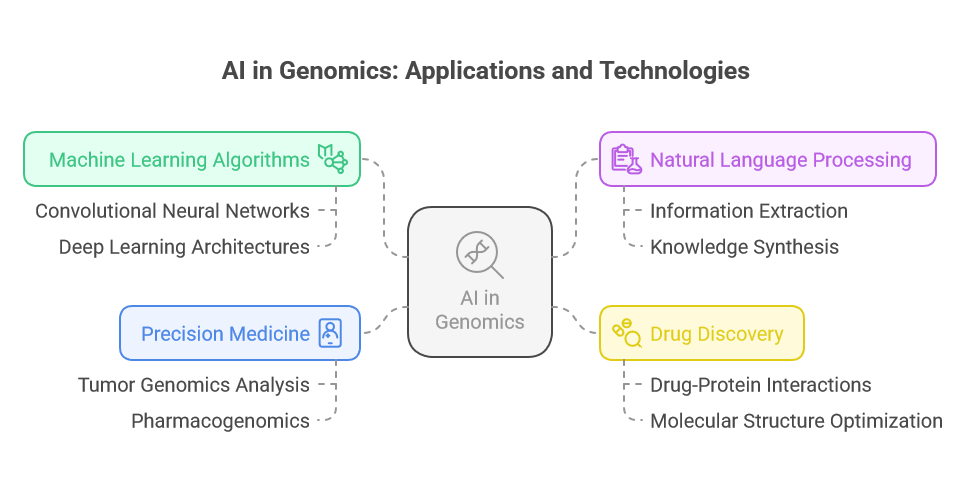
The applications of AI in genomics are vast. In drug discovery, AI accelerates the identification of novel drug targets by analyzing genetic and molecular data. It can also predict how different patients will respond to specific drugs, reducing the risk of adverse reactions and improving efficacy. In clinical diagnostics, AI-powered tools can detect rare genetic disorders, interpret variants of unknown significance, and guide treatment decisions in oncology, cardiology, and other specialties.
Precision medicine is perhaps the most significant application of AI in genomics. By integrating multi-omics data (genomics, proteomics, metabolomics) with clinical information, AI systems can generate personalized risk profiles and recommend tailored interventions. This approach is already transforming cancer care, where AI-driven genomic profiling guides the selection of targeted therapies and immunotherapies. As AI technologies continue to mature, their applications in genomics will only expand, driving further innovation and improving patient outcomes.
Market Segmentation Analysis
The AI in genomics market is segmented by component, application, and end-user, each with distinct growth dynamics. By component, the market is divided into hardware, software, and services. Hardware includes high-performance servers, GPUs, and storage solutions essential for processing large genomic datasets. Software encompasses AI algorithms, data analytics platforms, and visualization tools that enable researchers and clinicians to interpret genomic data. Services, which include consulting, implementation, and support, are experiencing rapid growth as organizations seek to integrate AI solutions into their workflows.
Software currently holds the largest revenue share, driven by the proliferation of AI-powered analytics platforms and the need for customizable solutions. However, the services segment is expected to grow at the fastest rate, as healthcare providers and research institutions increasingly rely on external expertise to deploy and manage AI systems. Hardware, while essential, is becoming more commoditized, with cloud-based solutions reducing the need for on-premises infrastructure.
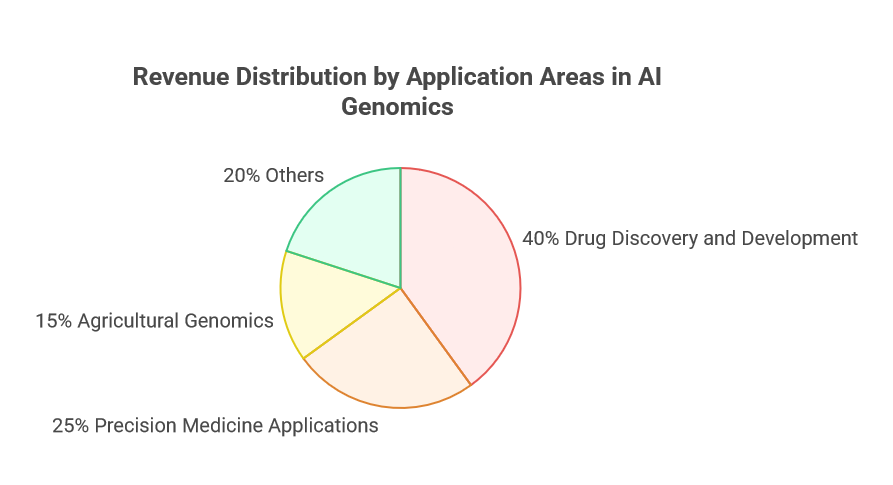
By application, the market is segmented into drug discovery, precision medicine, diagnostics, and others. Drug discovery and precision medicine are the largest and fastest-growing segments, reflecting the high value of AI-driven insights in these areas. Diagnostics is also a significant segment, particularly in rare disease detection and cancer genomics. Other applications include agricultural genomics, population health, and forensic genomics, each contributing to the overall market growth.
End-users of AI in genomics include pharmaceutical companies, research institutes, healthcare providers, and academic centers. Pharmaceutical companies are the largest adopters, leveraging AI to accelerate drug development and reduce costs. Research institutes and academic centers are also key users, driving innovation and advancing our understanding of the human genome. Healthcare providers are increasingly adopting AI-powered genomic tools to improve patient care, particularly in oncology and rare disease management.
Regional Market Dynamics
The regional dynamics of the AI in genomics market reveal a landscape of both established leaders and emerging contenders. North America, led by the United States, currently dominates the market, accounting for the largest share of global revenue. This leadership is attributed to several factors: a robust healthcare infrastructure, significant investment in research and development, and a high concentration of leading biotech and AI companies. The presence of major academic institutions and government initiatives, such as the National Institutes of Health’s All of Us Research Program, further fuels growth in the region.
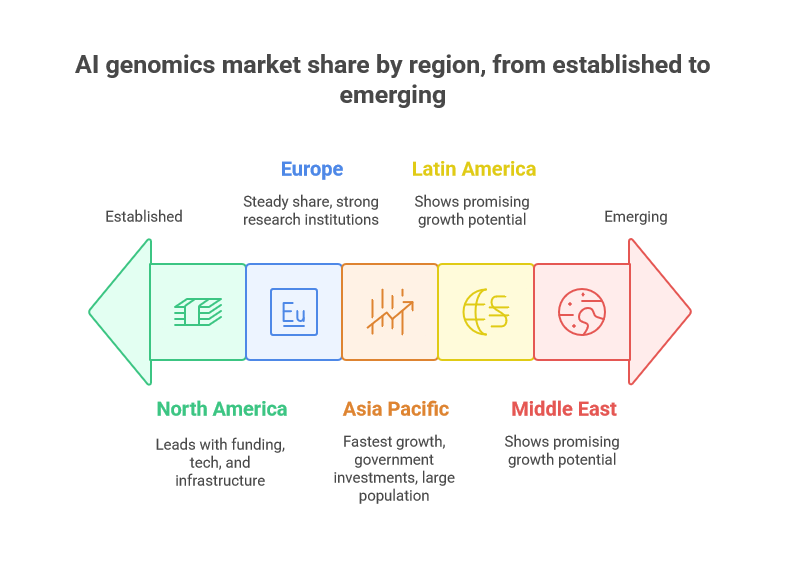
Europe is another significant market, with countries like the United Kingdom, Germany, and France investing heavily in genomics and AI research. The European Union’s focus on data privacy and ethical AI is shaping the regulatory landscape, ensuring that growth is balanced with patient protection. Collaborative projects, such as the European 1+ Million Genomes Initiative, are driving cross-border research and innovation.
The Asia Pacific region is emerging as a high-growth market, driven by increasing investments in healthcare infrastructure, rising awareness of precision medicine, and supportive government policies. Countries like China, Japan, and South Korea are making significant strides in genomics research, with China’s ambitious national genomics initiatives positioning it as a future leader. The region’s large and diverse population also provides a rich source of genomic data, enabling the development of AI models that are more representative of global genetic diversity.
Other regions, including Latin America and the Middle East, are beginning to invest in AI and genomics, though growth is slower due to limited infrastructure and funding. However, as the cost of sequencing and AI technologies continues to decline, these regions are expected to play a more significant role in the global market.
Competitive Landscape
The competitive landscape of the AI in genomics market is characterized by a mix of established technology giants, innovative startups, and leading research institutions. Major players include companies such as IBM Watson Health, Google Health (DeepMind), Microsoft Genomics, Illumina, and NVIDIA, each bringing unique strengths in AI, cloud computing, and genomics. These companies are investing heavily in research and development, seeking to maintain their competitive edge through innovation and strategic partnerships.
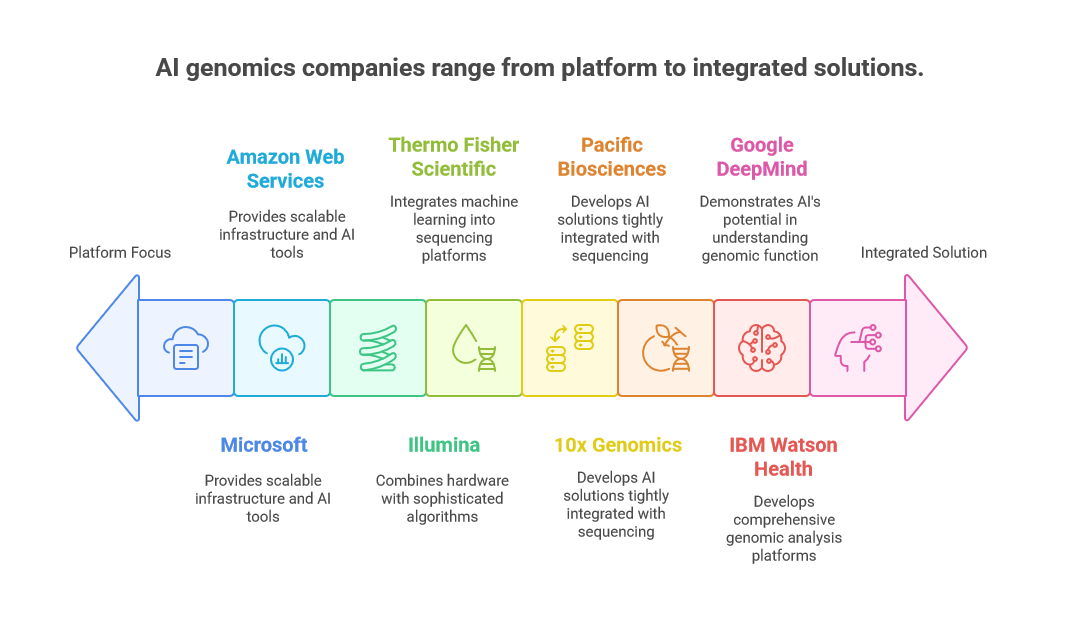
Startups are also playing a crucial role, driving innovation in niche areas such as rare disease diagnostics, population genomics, and AI-powered drug discovery. Companies like Tempus, Sophia Genetics, and PathAI are gaining traction by offering specialized solutions that address specific challenges in genomics. Many of these startups are attracting significant venture capital investment, reflecting the high growth potential of the market.
Partnerships and collaborations are a defining feature of the competitive landscape. Leading companies are forming alliances with academic institutions, healthcare providers, and pharmaceutical firms to accelerate research and bring AI-powered genomic solutions to market. For example, Illumina has partnered with Microsoft to develop cloud-based genomic analysis tools, while Google Health collaborates with hospitals and research centers to advance AI-driven diagnostics.
Mergers and acquisitions are also shaping the market, as larger companies seek to expand their capabilities and enter new markets. The competitive intensity is expected to increase as more players enter the field and as AI technologies continue to evolve.
Future Trends and Predictions
Looking ahead, the future of AI in genomics is bright, with several trends poised to shape the market over the next decade. First, advancements in AI technology—particularly in deep learning, federated learning, and explainable AI—will enable more accurate and interpretable genomic analyses. These technologies will facilitate the integration of multi-omics data, leading to a more holistic understanding of health and disease.
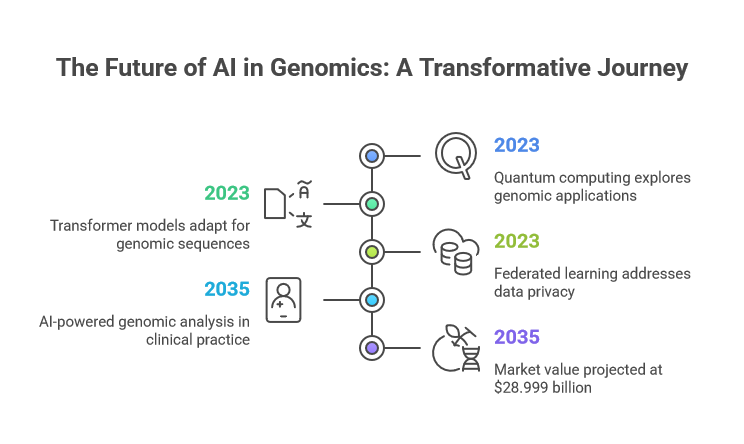
Second, the adoption of AI in clinical genomics will accelerate, driven by the growing demand for precision medicine and the increasing availability of genomic data. AI-powered tools will become standard in hospitals and clinics, guiding diagnosis, treatment selection, and disease prevention. This shift will be supported by government initiatives aimed at promoting genomics research and integrating AI into healthcare systems.
Long-term growth projections for the market remain robust, with analysts predicting continued double-digit growth through 2035. The declining cost of sequencing, combined with advances in AI, will make genomic analysis accessible to a broader range of healthcare providers and patients. This democratization of genomics will drive innovation and improve health outcomes worldwide.
Government initiatives will play a critical role in shaping the future of AI in genomics. Policies that promote data sharing, protect patient privacy, and support research funding will be essential for sustained growth. International collaboration will also be key, as the global nature of genomics research requires harmonized standards and shared resources.
In summary, AI is set to revolutionize genomics, unlocking new possibilities for research, diagnostics, and personalized medicine. As technology continues to advance and the market matures, the integration of AI and genomics will become a cornerstone of modern healthcare.
FAQs
- What is the projected growth of the Artificial Intelligence In Genomics Market from 2024 to 2035?
- How is the global market for Artificial Intelligence in genomics valued in 2024?
- What is the significance of a CAGR of 43.2% in the context of the Artificial Intelligence In Genomics Market?
- What factors contribute to the increasing valuation of the Artificial Intelligence In Genomics Market?









